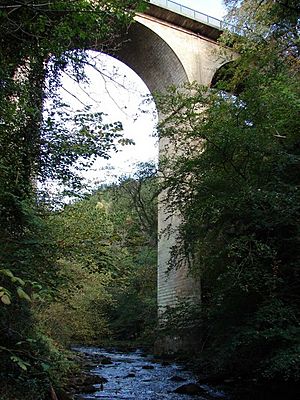Cartland Bridge facts for kids
Quick facts for kids Cartland Bridge |
|
|---|---|

View of the bridge from the river below
|
|
| Coordinates | 55°40′50″N 3°48′02″W / 55.680510°N 3.800458°W |
| Carries | Pedestrians and vehicles |
| Crosses | Mouse Water |
| Locale | Lanark, South Lanarkshire |
| Maintained by | South Lanarkshire Council |
| Preceded by | Cleghorn Bridge |
| Followed by | Mousemill Bridge |
| Characteristics | |
| Design | Arch bridge |
| Material | Dressed stone |
| Height | 39 meters |
| History | |
| Architect | Thomas Telford |
| Designer | Robert Hutchison |
| Construction begin | 1821 |
| Construction end | 1822 |
The Cartland Bridge is a historic road bridge located north-west of Lanark in South Lanarkshire, Scotland. It carries the A73 road over the Mouse Water, which is a small river that flows into the River Clyde.
This impressive bridge was finished in 1822. It was designed by the famous engineer Thomas Telford. The Cartland Bridge is special because it is the highest bridge over inland water in Scotland. It is also protected as a category B listed building, meaning it's an important historical structure.
Contents
About Cartland Bridge
Cartland Bridge is a vital link for traffic and people in the Lanark area. It connects different parts of the region by allowing vehicles and pedestrians to cross the deep valley of the Mouse Water.
What Does the Bridge Look Like?
The Cartland Bridge is an arch bridge. This means it uses strong, curved arches to support its weight and the weight of what crosses it. It has three main arches.
The bridge is built from dressed stone. This is stone that has been carefully cut and shaped to fit together perfectly. This type of construction makes the bridge very strong and durable.
How Tall Is It?
One of the most remarkable things about Cartland Bridge is its height. It stands about 39 meters (which is roughly 128 feet) above the Mouse Water below. This makes it the tallest bridge over an inland river or stream in Scotland.
Who Designed and Built It?
The main designer of Cartland Bridge was Thomas Telford. He was a very important Scottish civil engineer, architect, and stonemason. Telford designed many roads, canals, and bridges across Britain.
The construction of the bridge started in 1821 and was completed in 1822. Robert Hutchison also helped with the design. Building such a large bridge in the early 1800s was a big achievement!
Where Is It Located?
The bridge is situated near the town of Lanark in South Lanarkshire, Scotland. It crosses the Mouse Water, which is a tributary. A tributary is a smaller river or stream that flows into a larger one. In this case, the Mouse Water flows into the River Clyde.
The area around the bridge is quite scenic, with the river flowing through a deep gorge.
Why Is It Important?
Cartland Bridge is important for several reasons:
- Historical Significance: It's a great example of early 19th-century engineering.
- Architectural Design: It showcases the work of Thomas Telford, a master bridge builder.
- Local Connection: It has been a key part of the local transport network for over 200 years.
- Protected Status: Being a category B listed building means it's recognized for its special architectural or historic interest and is protected.
The bridge is maintained by the South Lanarkshire Council. This ensures it remains safe and usable for everyone.
 | Bayard Rustin |
 | Jeannette Carter |
 | Jeremiah A. Brown |

